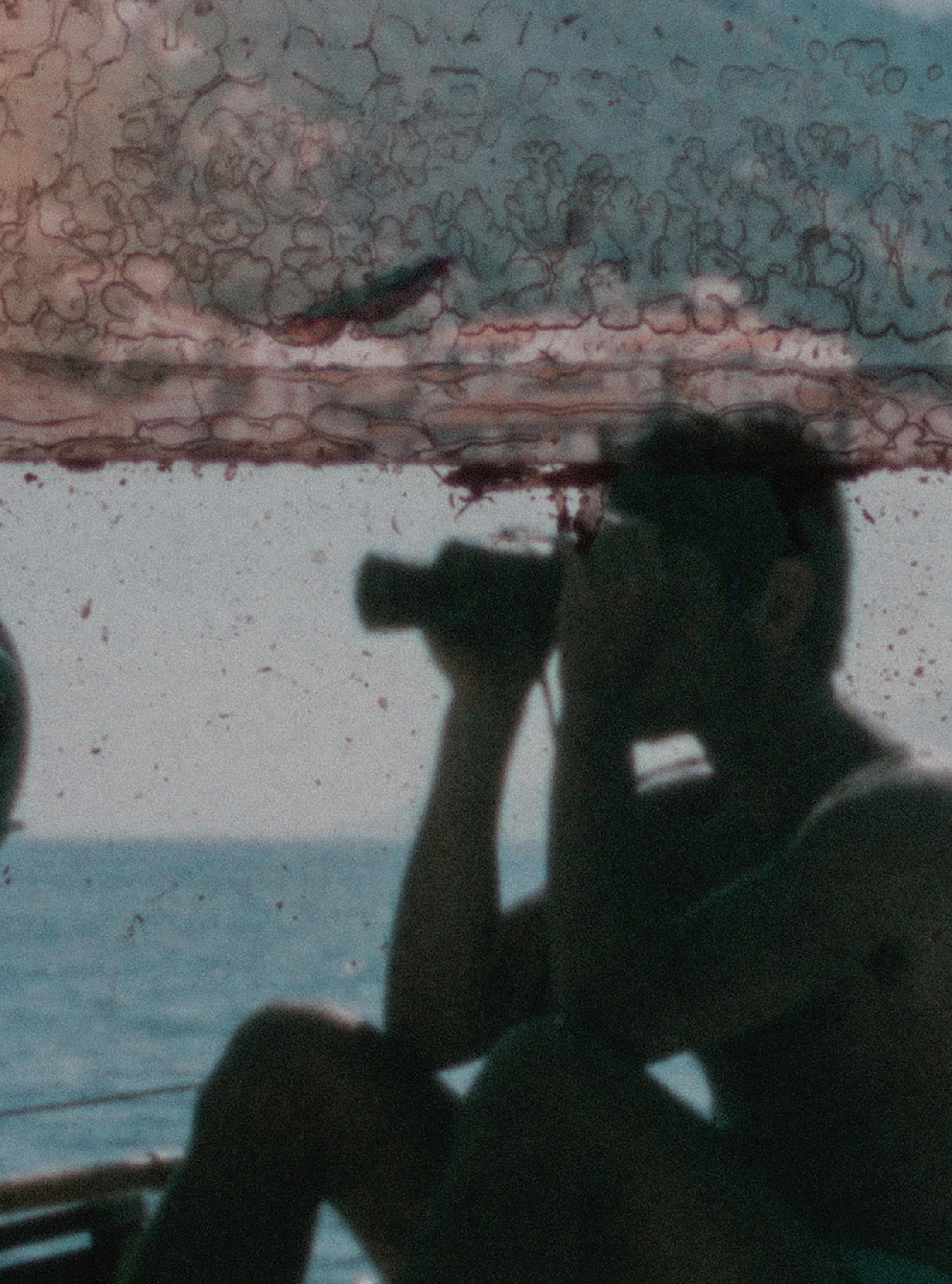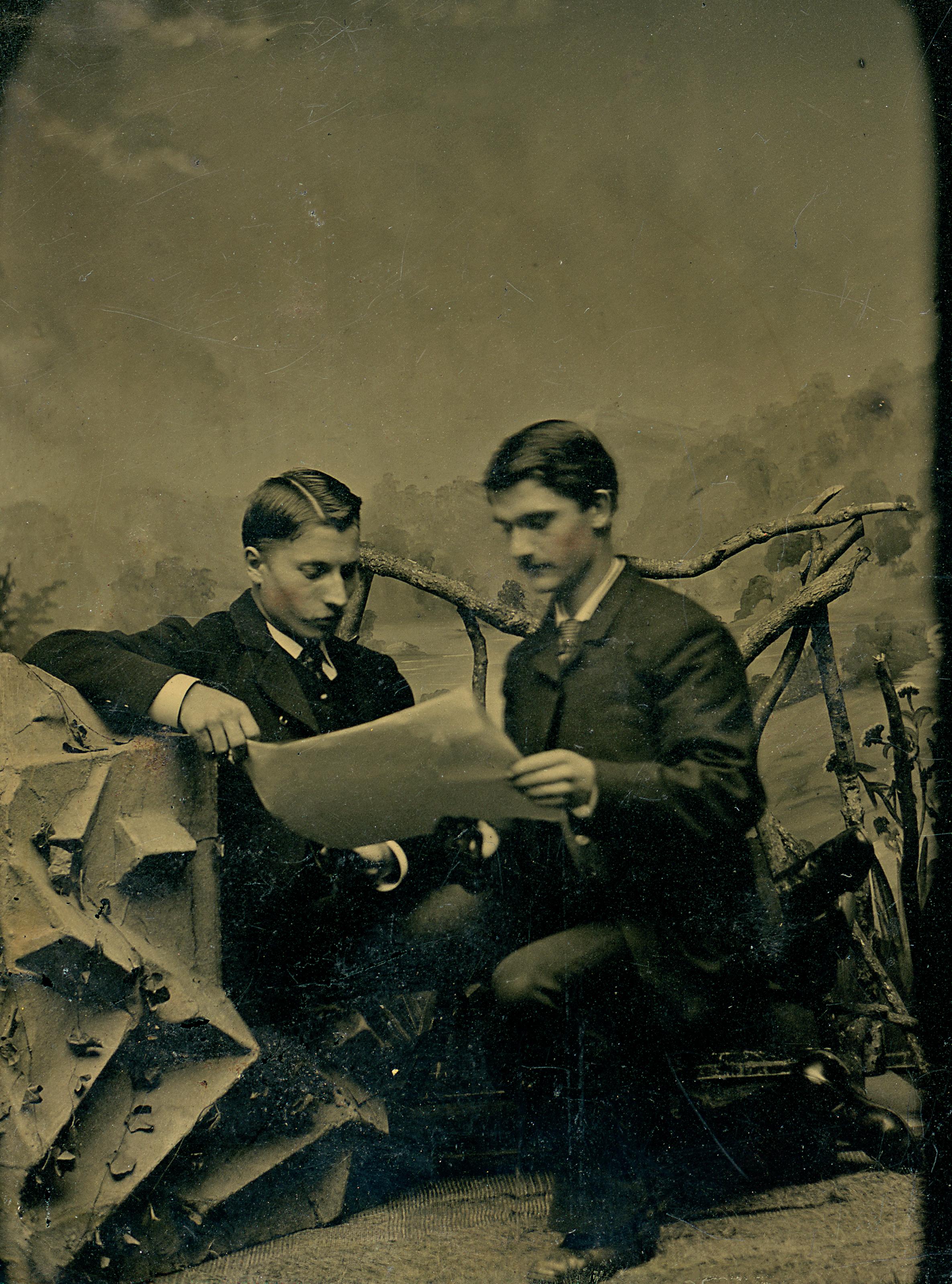
7 minute read
SAM ASHBY
CRUISING THE PAST: EXPLORING THE ARCHIVE AS A SITE OF LONGING AND DESIRE
Sam Ashby
Sam Ashby is a British artist and graphic designer. He graduated with a BA (Hons) in History of Art, Sheffield Hallam University, and went on to work as a film poster designer, creating awardwinning artwork for independent and arthouse films for the UK and international markets. Since 2010 he has collaborated with writers, academics and artists on his publication Little Joe, ‘a magazine about queers and cinema, mostly.’ Sam’s first film, The Colour of His Hair, premiered at the International Film Festival Rotterdam in 2017 and won the Best Documentary prize at the London Short Film Festival 2018. He is a recipient of the Van Abbemuseum’s Deviant Practice 2018 research grant.
CRUISING AS A METHODOLOGY What does it mean to take pleasure in research? To seek desire in the institution and find identification in the shelves and stacks of libraries and archives? Can I cruise the past?
Cruising — the act of looking for anonymous sex in public spaces — is a practice which feels like tradition, a queer inheritance passed down from generations of elders and forefathers. I was never taught to ‘cruise’, but somehow it became a practice that I understood. Somehow, I knew where to go. Somehow, I knew how to read the clues, the gestures, the glances.
I was never interested in History at school because I didn’t find myself in it. Instead I sought out other histories, in the lives of those whose experience on the margins reflected my own. But I had to learn to read the clues, to recognise the furtive gestures of the past.
Cruising is a largely solitary act dependent on the potential of an encounter with a subject. It is an act of patience; pleas ure or disappointment are its inevitable outcomes.
For me, artistic research is a loosely defined and open-ended practice akin to cruising. My subjects are often shifting territories, underrepresented lives. My encounters with them are ephemeral and yet are filled with potential new narratives and forms.
When I cruise, it is a longing for an inaccessible past, but also a passionate engagement with the present. I look at the archive, and the archive looks back. The Eagle Street College The Eagle Street College is a proposal for a narrative feature film drawn from archival research into an informal male literary society established in the working class community of Bolton, England in the late-19th Century. Known today as the Bolton Whitman Fellowship, the group met regularly to discuss the poetry of Walt Whitman and his lifelong work Leaves of Grass, which inspired a profound comradeship and political consciousness in them.
Within this unusual milieu, I have weaved a narrative in part from diaries and letters held at the Bolton Archives, to reveal a unique story at a moment in history when notions of a homosexual identity were first being conceived.
Like much of my work, The Eagle Street College looks to the past to as a way to comment on contemporary constructions of sexuality and gender.
Writer/Director Sam Ashby Script Supervisor Anna Seifert-Speck Additional Research Yaël Levy
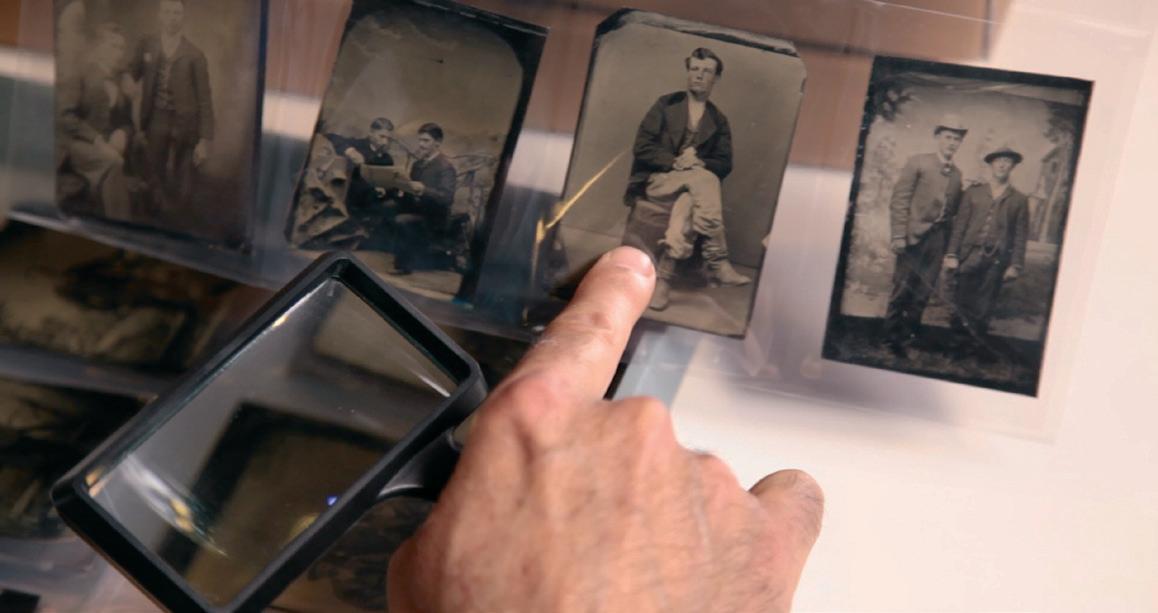
Still from preliminary research at IHLIA LGBT Heritage at Openbare Bibliotheek Amsterdam (OBA). With special thanks to Jasper Wiedeman.
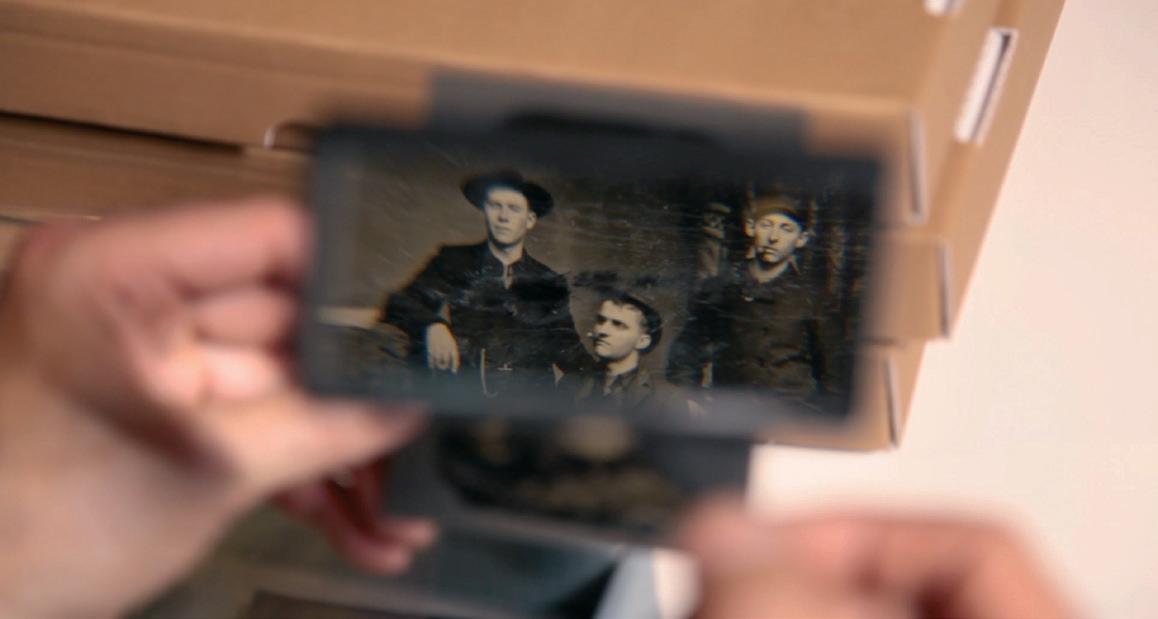
Still from preliminary research at IHLIA LGBT Heritage at Openbare Bibliotheek Amsterdam (OBA). With special thanks to Jasper Wiedeman.
OUT OF TIME, OUT OF PLACE Extract by Jon Davies
The traditional narrative of queer progress recounts how determined kids in the countryside and the suburbs leave their stifling biological families behind. Instead they migrate to join their spiritual brothers and sisters in big cities, which provide a degree of anonymity that nurtures sexual experimentation and the space to fashion one’s identity anew. But surely the innovative modes of psychic and cultural survival we honed for ourselves as youth in varying degrees of homophobic isolation deserve to be kept close to our hearts? These abject experiences form queer ways of being that hold onto feelings of shame and difference, allowing one to read between the lines and look askance at the dominant culture’s falsehoods.
Sam Ashby grew up in rural Hampshire, England in the 1980s and 90s. By contrast, I was swishing around a homogeneous white middle-class suburb of Montreal, Canada. These cultural wastelands provided appropriately bleak backdrops for our coming of age alongside the evolving AIDS pandemic: we developed our nascent queer identities under its life-threatening shadow, never far from the reminder that if you are gay every sexual encounter could mean death.
Sam and I share a fascination with the idiosyncratic, difficult and circuitous routes that young people of our generation and older had to journey in order to find traces of queer culture that spoke to us seemingly against all odds, allowing us to imagine futures for ourselves beyond our drab straight surroundings. In my case it was through glimpsing the subcultural world recreated in Mary Harron’s feature film I Shot Andy Warhol (1996) and miraculously discovering some of Kenneth Anger’s and John Greyson’s experimental works on video at the local library. I think of myself as part of the last queer generation in the West to have been forced to seek out these life-giving discoveries before the Internet made even the most underground queer cultural object accessible to all. I can’t help but feel that something is lost — a sensitising experience of marginality, perhaps — when the queer cultural archive is easily accessible and no longer needs to be gleaned through whispers and fragments.
The Internet not only (falsely) promises that everything that one could ever possibly want to know about the past is available to you, but that the images of LGBT life that are most widely disseminated are still those that are the most affirmative. Affirmative in the sense of telling you that being LGBT is ok and “it gets better,” but also affirmative of neoliberal capitalism, which now has a place set for you — and your monogamous, gainfully employed life partner -at the IKEA dinner table.
Cruising Sam’s work as well as his notes and proposals for future projects, I am struck by the fervour of his desire to forge a connection to a buried queer past. Turning away from contemporary models of identity that frame LGBT citizenship through state approval, he instead looks backwards to how people found each other in love and lust before “queer.” Ecstatically “out of time,” Sam almost seems to be seeking belated communion with the ephemeral couplings and fragile collectivities he finds.
—Jon Davies is a writer, curator and PhD student in Art History at Stanford University. This text was commissioned as part of my research publication.

Funded by Van Abbemuseum, Eindhoven
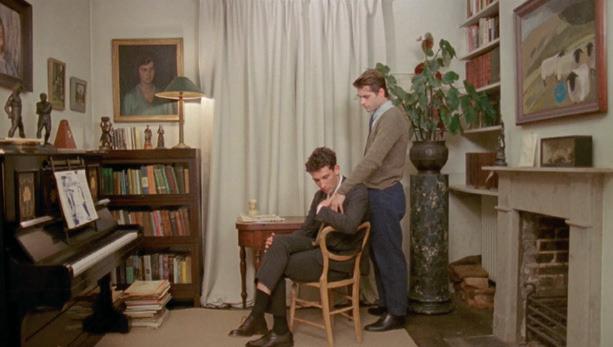
Director Sam Ashby Writer Elizabeth Montagu Cast Sean Hart, Josh O’Connor Camera Jessica Sarah Rinland Music Leslie Deere Sound Joe Campbell Colourist Chloe Thorne Funded by BFI, Wellcome Trust

Director Sam Ashby Music Jordan Hunt Sound Joe Campbell Colourist Chloe Thorne Commissioner London Short Film Festival Funded by Arts Council England Rural Queer Networks Contrary to the assumed narrative that queer people need to move to cities in order to lead more fulfilled lives, this ongoing research project, initiated while on the Master of Film programme, aims to recover alternative narratives in order to show that queer migration to and collectivity in rural areas has also taken place. By drawing focus on the rural, I am also interested in questioning what it means to be queer outside of the city, where so much of our identity is coded and enacted through our relationship to designed space and architecture, metropolitan networks, and capitalist economies.
The Colour of His Hair The Colour of His Hair merges drama and documentary into an impressionistic meditation on queer life before and after the partial legalisation of homosexuality in 1967. The film is based on an unrealised film script written in 1964 for The Homosexual Law Reform Society, a British organisation that campaigned for the decriminalisation of homosexual relations between men. Completed while on the Master of Film program, The Colour of His Hair premiered at the International Film Festival Rotterdam in 2017 and won the Best Documentary prize at the London Short Film Festival 2018.
Et in Arcadia Ego Et in Arcadia Ego takes the recent discussion around the closure of queer safe spaces and focusses it on the closure of public toilets. By documenting many of London’s ‘cottages’ on Super8, I explored them as a series of contemporary ruins evoking a lost language. The film was commissioned by London Short Film Festival as a companion to William E. Jones’ Tearoom (1962/2007) and was completed while on the Master of Film programme.

